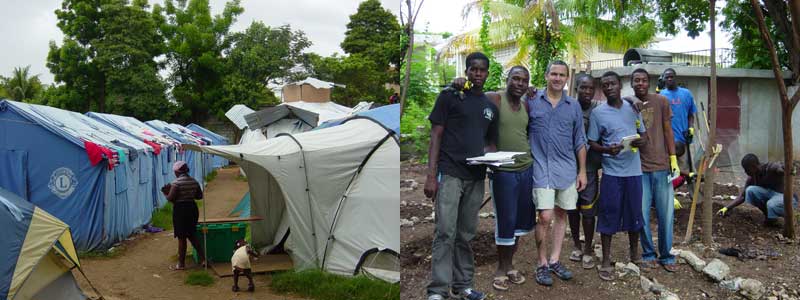Bon Appétit team member planting a sustainable future for Haiti
- by tribe
Left: David has been staying at this ‘tent city’ in Port-au-Prince; Right: David and his newly-hired gardeners take a break from planting an herb garden.
While quake-ravaged Haiti may no longer make the front page of the newspaper every day, there’s no forgetting the acute and long-term damage wrought by January 12’s massive earthquake. Bon Appétit team member David Lachance sure hasn’t forgotten. For two months this summer, he is planting a sustainable garden on the grounds of Visitation Hospital in Petite Riviere de Nippes, a small rural village roughly four hours from the Haitian capital of Port-au-Prince. Working with local Haitians, David hopes to “develop, educate, document and nurture this project so that it can be a lasting benefit to the clinic and local people.”
David spent his first few days getting acquainted with the area, which due to bad roads is difficult to navigate. He writes: “I hired a driver and interpreter today to take me 45 miles in only 4½ hours…all bad roads. The roads in Port-au-Prince are clogged and rubble makes travel a battle between trucks and Tap Taps (local taxis that you hop on for a few coins). My driver drives crazy and has only one eye functioning.” Although he has his own tent at a tent city operated by an American parish, showers, toilet-flushing and the use of hot water are discouraged in the interest of water conservation. As such, “Everyone stinks in a nice way.” David shares meals with other inhabitants, including Portuguese doctors and nurses, Kenyan service workers and American anthropologists. Occasionally, Sister Mary announces s Happy Hour with refreshingly cold bottles of Prestige, a Haitian beer! He encourages us to “look for it [Prestige] in your favorite import store and help the Haitian economy while treating yourself to a refreshing beer…if they don’t carry it demand it.”
With his tiller stuck in customs, David has thus far been limited to planting a small herb garden. His initial survey of the area revealed fertile grounds and thriving banana trees, so he’s optimistic that the main garden will thrive. With the help of his interpreter, David plans to hire local young men and women to assist in planning, planting and maintaining the garden. Providing work will likely prove to be as important as the garden itself; David comments that “the young men that I hired for $2.00 a day would work forever and very hard…but jobs aren’t here. That will become the main problem I think. No future.”
We’ll blog about David’s work as he sends us updates from Haiti. For more information, please visit www.visitationhospital.org.
